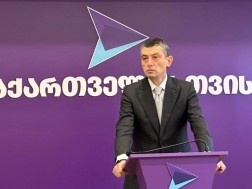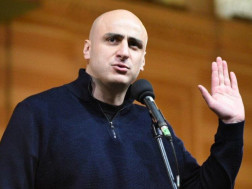The prime minister of Georgia has resigned over plans to arrest an opposition leader, saying the move could cause "political escalation".
Giorgi Gakharia said a court decision to place Nika Melia in pre-trial detention posed "a risk to the health and lives of our citizens".
Mr Melia has been accused of organising mass violence during anti-government protests in 2019.
He denies the charges but faces a nine-year sentence if convicted.
The country's Interior Ministry said in a tweet that Mr Melia's arrest had been "temporarily postponed" after the prime minister announced he was stepping down on Thursday morning.
Why were there plans to arrest Nika Melia?
Earlier this week, a court in the capital Tbilisi ordered that the opposition leader should be arrested for failing to pay an increased bail fee.
Mr Melia, who leads the United National Movement, told AFP news agency that the charges were "part of ongoing repressions against the opposition".
Georgia has been gripped by a political crisis over the results of parliamentary elections in October, with protesters and the opposition accusing the ruling party of rigging the poll and intimidating voters.
The case against Mr Melia dates back to 2019, when thousands of protesters attempted to storm Georgia's parliament after a Russian MP took the Speaker's seat and gave a speech in Russian.
At odds with his party?
Analysis by Rayhan Demytrie, BBC News, Tbilisi
It may seem surprising for a prime minister to resign in protest over the possible arrest of his political opponent, but Giorgi Gakharia appears to have realised the risks of jailing a senior opposition figure.
It puts him at odds with more hard-line members of the governing Georgian Dream party. They want to punish Nika Melia for disrespecting the law.
But the timing is risky. Georgia faces a deepening political crisis. The country's opposition parties have refused to enter parliament since last October's elections, which they say were fraudulent.
There was an expectation among voters that the election would result in the first ever coalition government in Georgia. Instead, with the current boycott from the opposition, Georgia is effectively a one-party state.
via BBC
















